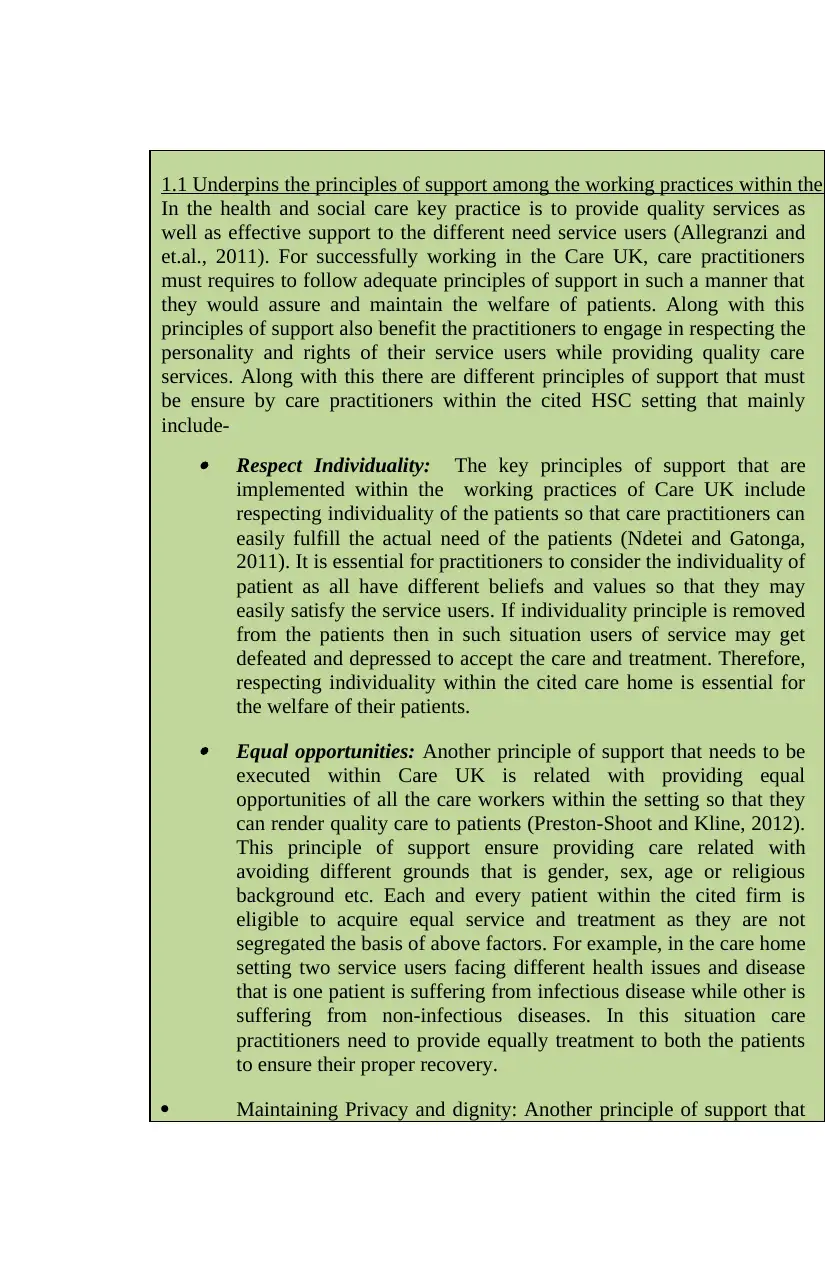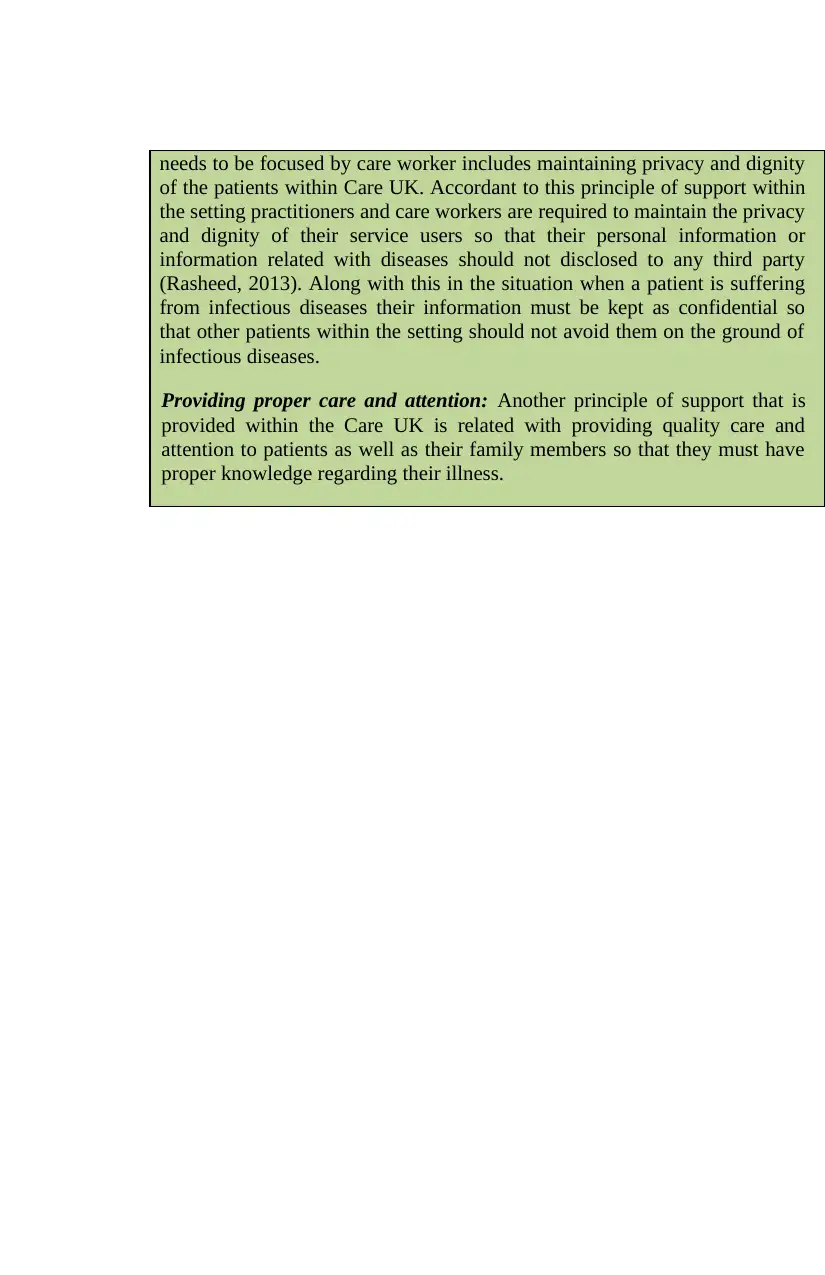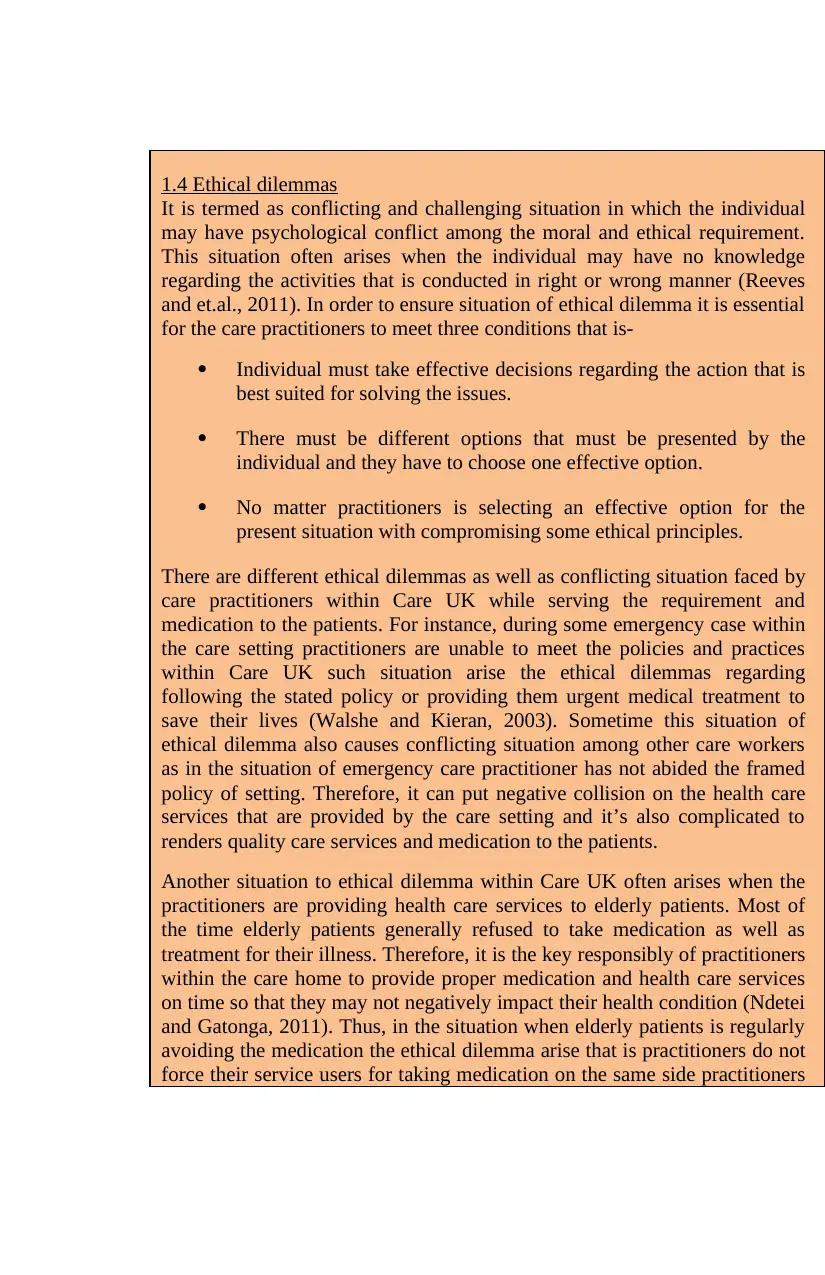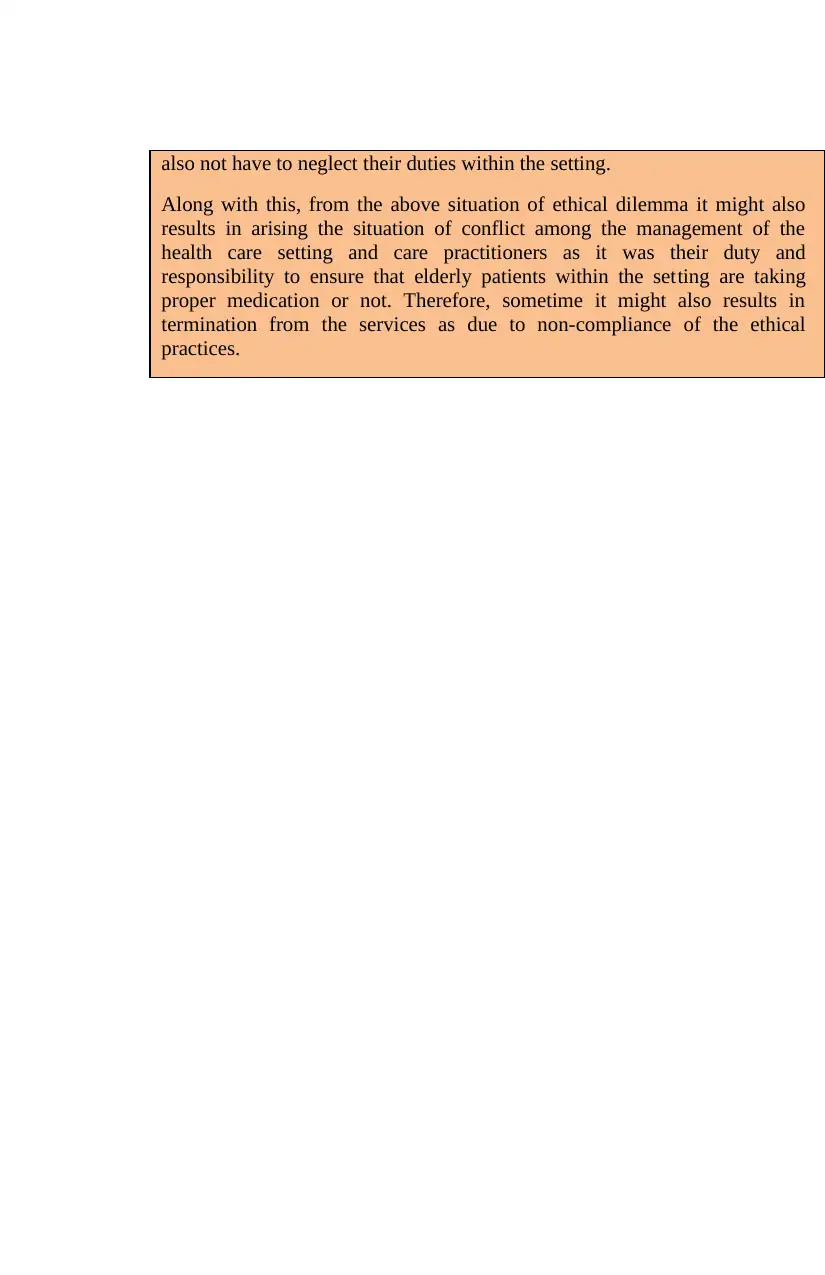Care UK: Principles of Support and Ethical Dilemmas in Patient Care
VerifiedAdded on 2023/04/17
|4
|975
|285
Essay
AI Summary
This essay examines the principles of support within health and social care, particularly in the context of Care UK, emphasizing the importance of quality service and effective patient support. It highlights key principles such as respecting individuality, ensuring equal opportunities, maintaining privacy and dignity, and providing proper care and attention. The essay also addresses ethical dilemmas faced by care practitioners, such as balancing policy adherence with urgent medical needs and managing elderly patients' refusal of medication. These dilemmas can lead to conflicts among care workers and management, potentially impacting the quality of care and resulting in non-compliance issues. The analysis underscores the complexities of ethical decision-making in healthcare and the responsibilities of practitioners in upholding ethical standards while providing patient-centered care.

1.1 Underpins the principles of support among the working practices within the
In the health and social care key practice is to provide quality services as
well as effective support to the different need service users (Allegranzi and
et.al., 2011). For successfully working in the Care UK, care practitioners
must requires to follow adequate principles of support in such a manner that
they would assure and maintain the welfare of patients. Along with this
principles of support also benefit the practitioners to engage in respecting the
personality and rights of their service users while providing quality care
services. Along with this there are different principles of support that must
be ensure by care practitioners within the cited HSC setting that mainly
include-
Respect Individuality: The key principles of support that are
implemented within the working practices of Care UK include
respecting individuality of the patients so that care practitioners can
easily fulfill the actual need of the patients (Ndetei and Gatonga,
2011). It is essential for practitioners to consider the individuality of
patient as all have different beliefs and values so that they may
easily satisfy the service users. If individuality principle is removed
from the patients then in such situation users of service may get
defeated and depressed to accept the care and treatment. Therefore,
respecting individuality within the cited care home is essential for
the welfare of their patients. Equal opportunities: Another principle of support that needs to be
executed within Care UK is related with providing equal
opportunities of all the care workers within the setting so that they
can render quality care to patients (Preston-Shoot and Kline, 2012).
This principle of support ensure providing care related with
avoiding different grounds that is gender, sex, age or religious
background etc. Each and every patient within the cited firm is
eligible to acquire equal service and treatment as they are not
segregated the basis of above factors. For example, in the care home
setting two service users facing different health issues and disease
that is one patient is suffering from infectious disease while other is
suffering from non-infectious diseases. In this situation care
practitioners need to provide equally treatment to both the patients
to ensure their proper recovery.
Maintaining Privacy and dignity: Another principle of support that
In the health and social care key practice is to provide quality services as
well as effective support to the different need service users (Allegranzi and
et.al., 2011). For successfully working in the Care UK, care practitioners
must requires to follow adequate principles of support in such a manner that
they would assure and maintain the welfare of patients. Along with this
principles of support also benefit the practitioners to engage in respecting the
personality and rights of their service users while providing quality care
services. Along with this there are different principles of support that must
be ensure by care practitioners within the cited HSC setting that mainly
include-
Respect Individuality: The key principles of support that are
implemented within the working practices of Care UK include
respecting individuality of the patients so that care practitioners can
easily fulfill the actual need of the patients (Ndetei and Gatonga,
2011). It is essential for practitioners to consider the individuality of
patient as all have different beliefs and values so that they may
easily satisfy the service users. If individuality principle is removed
from the patients then in such situation users of service may get
defeated and depressed to accept the care and treatment. Therefore,
respecting individuality within the cited care home is essential for
the welfare of their patients. Equal opportunities: Another principle of support that needs to be
executed within Care UK is related with providing equal
opportunities of all the care workers within the setting so that they
can render quality care to patients (Preston-Shoot and Kline, 2012).
This principle of support ensure providing care related with
avoiding different grounds that is gender, sex, age or religious
background etc. Each and every patient within the cited firm is
eligible to acquire equal service and treatment as they are not
segregated the basis of above factors. For example, in the care home
setting two service users facing different health issues and disease
that is one patient is suffering from infectious disease while other is
suffering from non-infectious diseases. In this situation care
practitioners need to provide equally treatment to both the patients
to ensure their proper recovery.
Maintaining Privacy and dignity: Another principle of support that
Paraphrase This Document
Need a fresh take? Get an instant paraphrase of this document with our AI Paraphraser

needs to be focused by care worker includes maintaining privacy and dignity
of the patients within Care UK. Accordant to this principle of support within
the setting practitioners and care workers are required to maintain the privacy
and dignity of their service users so that their personal information or
information related with diseases should not disclosed to any third party
(Rasheed, 2013). Along with this in the situation when a patient is suffering
from infectious diseases their information must be kept as confidential so
that other patients within the setting should not avoid them on the ground of
infectious diseases.
Providing proper care and attention: Another principle of support that is
provided within the Care UK is related with providing quality care and
attention to patients as well as their family members so that they must have
proper knowledge regarding their illness.
of the patients within Care UK. Accordant to this principle of support within
the setting practitioners and care workers are required to maintain the privacy
and dignity of their service users so that their personal information or
information related with diseases should not disclosed to any third party
(Rasheed, 2013). Along with this in the situation when a patient is suffering
from infectious diseases their information must be kept as confidential so
that other patients within the setting should not avoid them on the ground of
infectious diseases.
Providing proper care and attention: Another principle of support that is
provided within the Care UK is related with providing quality care and
attention to patients as well as their family members so that they must have
proper knowledge regarding their illness.

1.4 Ethical dilemmas
It is termed as conflicting and challenging situation in which the individual
may have psychological conflict among the moral and ethical requirement.
This situation often arises when the individual may have no knowledge
regarding the activities that is conducted in right or wrong manner (Reeves
and et.al., 2011). In order to ensure situation of ethical dilemma it is essential
for the care practitioners to meet three conditions that is-
Individual must take effective decisions regarding the action that is
best suited for solving the issues.
There must be different options that must be presented by the
individual and they have to choose one effective option.
No matter practitioners is selecting an effective option for the
present situation with compromising some ethical principles.
There are different ethical dilemmas as well as conflicting situation faced by
care practitioners within Care UK while serving the requirement and
medication to the patients. For instance, during some emergency case within
the care setting practitioners are unable to meet the policies and practices
within Care UK such situation arise the ethical dilemmas regarding
following the stated policy or providing them urgent medical treatment to
save their lives (Walshe and Kieran, 2003). Sometime this situation of
ethical dilemma also causes conflicting situation among other care workers
as in the situation of emergency care practitioner has not abided the framed
policy of setting. Therefore, it can put negative collision on the health care
services that are provided by the care setting and it’s also complicated to
renders quality care services and medication to the patients.
Another situation to ethical dilemma within Care UK often arises when the
practitioners are providing health care services to elderly patients. Most of
the time elderly patients generally refused to take medication as well as
treatment for their illness. Therefore, it is the key responsibly of practitioners
within the care home to provide proper medication and health care services
on time so that they may not negatively impact their health condition (Ndetei
and Gatonga, 2011). Thus, in the situation when elderly patients is regularly
avoiding the medication the ethical dilemma arise that is practitioners do not
force their service users for taking medication on the same side practitioners
It is termed as conflicting and challenging situation in which the individual
may have psychological conflict among the moral and ethical requirement.
This situation often arises when the individual may have no knowledge
regarding the activities that is conducted in right or wrong manner (Reeves
and et.al., 2011). In order to ensure situation of ethical dilemma it is essential
for the care practitioners to meet three conditions that is-
Individual must take effective decisions regarding the action that is
best suited for solving the issues.
There must be different options that must be presented by the
individual and they have to choose one effective option.
No matter practitioners is selecting an effective option for the
present situation with compromising some ethical principles.
There are different ethical dilemmas as well as conflicting situation faced by
care practitioners within Care UK while serving the requirement and
medication to the patients. For instance, during some emergency case within
the care setting practitioners are unable to meet the policies and practices
within Care UK such situation arise the ethical dilemmas regarding
following the stated policy or providing them urgent medical treatment to
save their lives (Walshe and Kieran, 2003). Sometime this situation of
ethical dilemma also causes conflicting situation among other care workers
as in the situation of emergency care practitioner has not abided the framed
policy of setting. Therefore, it can put negative collision on the health care
services that are provided by the care setting and it’s also complicated to
renders quality care services and medication to the patients.
Another situation to ethical dilemma within Care UK often arises when the
practitioners are providing health care services to elderly patients. Most of
the time elderly patients generally refused to take medication as well as
treatment for their illness. Therefore, it is the key responsibly of practitioners
within the care home to provide proper medication and health care services
on time so that they may not negatively impact their health condition (Ndetei
and Gatonga, 2011). Thus, in the situation when elderly patients is regularly
avoiding the medication the ethical dilemma arise that is practitioners do not
force their service users for taking medication on the same side practitioners
⊘ This is a preview!⊘
Do you want full access?
Subscribe today to unlock all pages.

Trusted by 1+ million students worldwide

also not have to neglect their duties within the setting.
Along with this, from the above situation of ethical dilemma it might also
results in arising the situation of conflict among the management of the
health care setting and care practitioners as it was their duty and
responsibility to ensure that elderly patients within the setting are taking
proper medication or not. Therefore, sometime it might also results in
termination from the services as due to non-compliance of the ethical
practices.
Along with this, from the above situation of ethical dilemma it might also
results in arising the situation of conflict among the management of the
health care setting and care practitioners as it was their duty and
responsibility to ensure that elderly patients within the setting are taking
proper medication or not. Therefore, sometime it might also results in
termination from the services as due to non-compliance of the ethical
practices.
1 out of 4
Related Documents
Your All-in-One AI-Powered Toolkit for Academic Success.
+13062052269
info@desklib.com
Available 24*7 on WhatsApp / Email
![[object Object]](/_next/static/media/star-bottom.7253800d.svg)
Unlock your academic potential
Copyright © 2020–2026 A2Z Services. All Rights Reserved. Developed and managed by ZUCOL.





